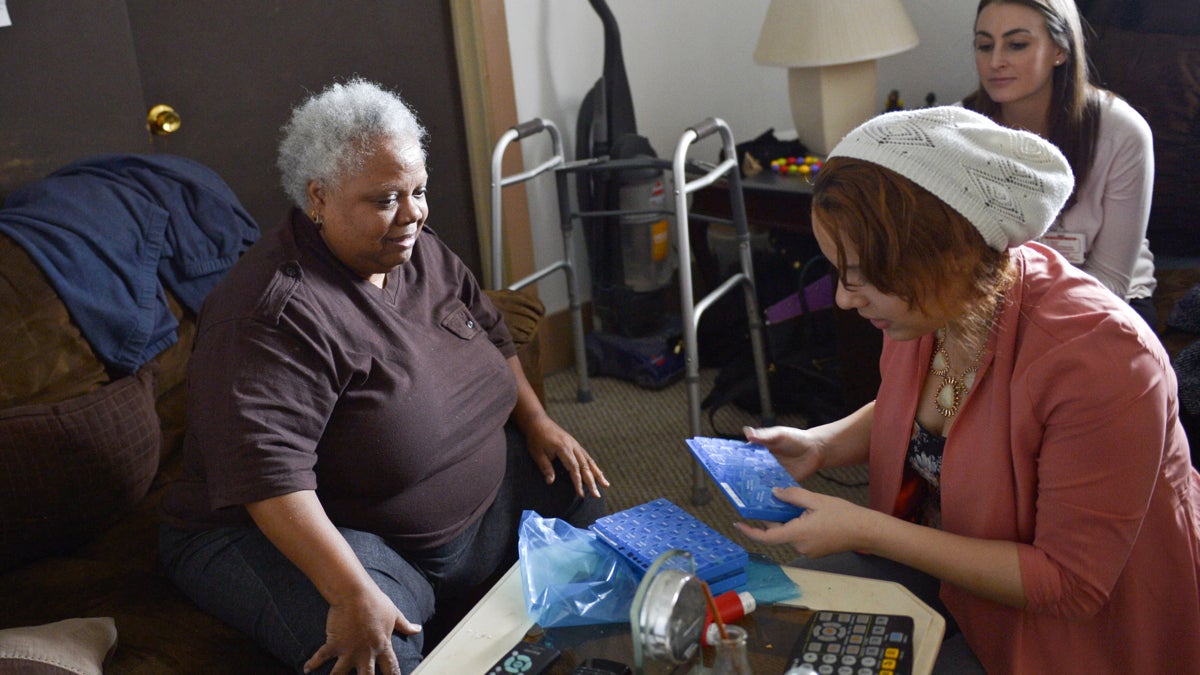Health care collaboratives aim to help Medicaid enrollees in three NJ cities

Members of the Camden Coalition team make a home visit in Camden in 2014. (Couresy of Lynsey Addario/Camden Coalition)
Three health care collaboratives in New Jersey now have state approval to share patient information in an effort to improve the health of people in the Medicaid program.
The Trenton Health Team, the Healthy Greater Newark ACO – a sister organization to the Greater Newark Healthcare Coalition – and the Camden Coalition of Healthcare Providers are now Medicaid Accountable Care Organizations in their communities.
“They’ve actually been called ‘totally accountable care organizations,’ because they pick a geographic region, and they are actually supposed to be accountable for all of the patients within that region,” said Jeff Brown, executive director of the QI Collaborative. His group provides technical assistance and advice to the health care organizations.
The ACOs hope to lower costs by guiding people to lower-cost health care settings such as doctor’s offices, instead of emergency rooms.
“We are spending money often in the wrong places,” said Jeff Brenner, executive director of the Camden Coalition ACO. Too often, he said, the health system “medicalizes” social problems as well as mental health and addiction issues.
ACO workers will help solve “upstream” issues for Medicaid patients, so concerns over things such as transportation or housing won’t become a barrier to health care. Care coordination is another tenet of ACO work.
In Trenton, two hospitals, a health center and the city government have been working together for years to improve resisdents’ health. The new status as an ACO gives the Trenton Health Team access to billing and claims information.
“We seek to identify those who are the highest risk, or highest cost, those who have true gaps in their care, and poor outcomes, who are ending up in the ER 20, 30, 100 – even more – times a year, or frequently admitted to the hospital,” said Gregory Paulson, executive director of the collaborative.
“As a Medicaid ACO, the Trenton Health Team is responsible for all Medicaid beneficiaries in the six ZIP codes of Trenton,” he said.
A three-year pilot program is starting this week. The Rutgers Center for State Health Policy will evaluate the trial, and, if the organizations demonstrate that they can improve health and save money, they could share in health care savings.
The ACOs have state approval, but they’ll have to broker independent deals with the managed care organizations, the insurance companies that have enrolled Medicaid patients in each community.
Those contracts will determine how much savings will be shared with the ACOs and the amount of upfront, per-person money each group will receive to fund their work.
Paulson said the groups need reasonable and effective funding strategies “to be whole financially.”
All three organizations have built teams, hired staff and already started some of their work with initial funding from the Nicholson Foundation.
WHYY is your source for fact-based, in-depth journalism and information. As a nonprofit organization, we rely on financial support from readers like you. Please give today.

